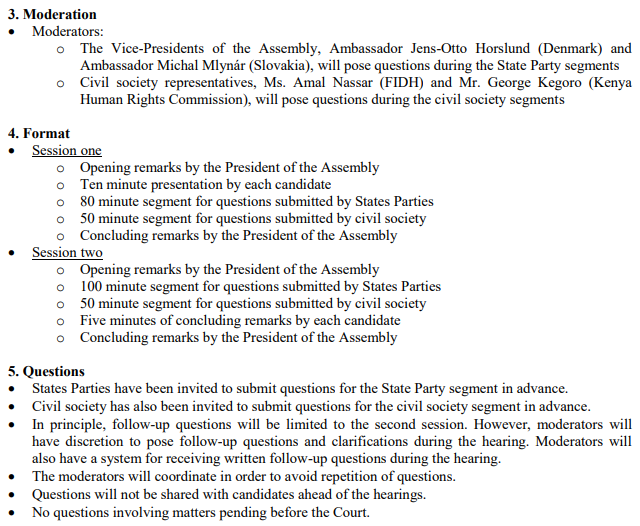Session 2 of the public hearings with the CEP-shortlisted candidates for the position of the 3rd ICC Prosecutor (2021-30) is about to begin (3pm CEST).
Webstream: http://player.cdn.tv1.eu/statics/66005/icc.html.
Sequence: @ICC_PASP remarks; SPs questions, CSO questions; candidates' concluding remarks
Webstream: http://player.cdn.tv1.eu/statics/66005/icc.html.
Sequence: @ICC_PASP remarks; SPs questions, CSO questions; candidates' concluding remarks
Segment: States Parties' Qs
1. MA and FG, is there a conflict of interest on account of your past involvement in ICC cases?
MA: being an LRV in Kenya doesn't per se disqualify me; RS&RPE have checks/balances to resolve the issue. No conflict: victims I represented are no parties
1. MA and FG, is there a conflict of interest on account of your past involvement in ICC cases?
MA: being an LRV in Kenya doesn't per se disqualify me; RS&RPE have checks/balances to resolve the issue. No conflict: victims I represented are no parties
FG: should not confuse relevant experience/qualifications and conflict of interests in relation to specific cases. The only case which has been closed - Kenyatta - I may have to recuse myself if it comes to this.
2. Handling large-scale cases
SO: recounts her experience (again).
2. Handling large-scale cases
SO: recounts her experience (again).
RR: have been exposed to large-scale/international crimes cases at the domestic level, requiring cooperation with national authorities (rehearsing what he said yesterday - but that's a repetitive Q).
3. Budgeting experience
FG: a prosecutor, not accountant; did prepare plans.
3. Budgeting experience
FG: a prosecutor, not accountant; did prepare plans.
4. Purposes of PE, what changes needed
SO: identifying cases and ensuring admissibility of evidence (no?); more streamlined, effective PEs
MA: careful review/analysis of info (fake digital evidence), determining reasonable basis; prioritizing evidence review as main improvement
SO: identifying cases and ensuring admissibility of evidence (no?); more streamlined, effective PEs
MA: careful review/analysis of info (fake digital evidence), determining reasonable basis; prioritizing evidence review as main improvement
RR: determining whether ICC would exercise jurisdiction; complementarity and gravity analysis. Timing is the issue. PE should be conducted rigorously; collecting/preserving evidence; streamlining process; gathering intel.
FG: art 53 is a screening process to filter out cases not
FG: art 53 is a screening process to filter out cases not
within jurisdiction. A low standard of proof. Important not to spend resources where ICC has no jurisdiction. AC: lengthy PE were not the idea. Policy change: should wait for the IER recommendations.
5. Victims' role; how to ensure effective witness protection
FG: the most rewarding work he has done was the work with victims. Insider witness protection is the biggest problem; they are targeted. We should explore depositions; cyber- and financial investigation techniques.
FG: the most rewarding work he has done was the work with victims. Insider witness protection is the biggest problem; they are targeted. We should explore depositions; cyber- and financial investigation techniques.
RR: worked a lot with the victims in sex crime prosecutions. Important to listen to victims; it's not only about protection but also about preventing re-victimization (too general...)
MA: 3 instances victimization - by perpetrator; when participating; when waiting for reparations
MA: 3 instances victimization - by perpetrator; when participating; when waiting for reparations
Prosecutor should prevent secondary victimization; manage expectations carefully, closely coordinate with the Registry
SO: victims important stakeholders; they need to be heard and info must be shared by P at all stages of the case; info must be relevant and translated
SO: victims important stakeholders; they need to be heard and info must be shared by P at all stages of the case; info must be relevant and translated
they should not merely be used by the OTP; coordination with Registry needed.
6. Judges critical of OTP investigations - what to do?
RR: firm believer in high-quality investigations; social media evidence - need skills and tools to work with that evidence and present it properly
6. Judges critical of OTP investigations - what to do?
RR: firm believer in high-quality investigations; social media evidence - need skills and tools to work with that evidence and present it properly
MA: criticisms from Chambers for the lack of preparedness on the part of OTP are embarrassing - this should be precluded by proper staffing (hiring local investigators who understand the dynamics); prepare well before trial: need dedicated prosecutors. Recalls incidents in Gbagbo
SO: requirement for training of investigators/prosecutors. Prosecutor-led investigations; involvement by attorneys at all stages (checks notes...)
FG: no difficulty proving crimes on the ground, but there's a dearth of proper linkage evidence. This is what needs to be rectified.
FG: no difficulty proving crimes on the ground, but there's a dearth of proper linkage evidence. This is what needs to be rectified.
Focus the entire OTP operation on understanding the structures and links between different units.
7. Cooperation w/states (non-)parties concerned in opening/conducting investigations
MA: SnPs are always potential parties. Establish relations before asking help; set up networks.
7. Cooperation w/states (non-)parties concerned in opening/conducting investigations
MA: SnPs are always potential parties. Establish relations before asking help; set up networks.
RR: forging partnerships with local authorities, negotiate to have access to investigate independently; honest discussion with the country on this principle and countering witness tampering; know the history and context.
FG: SnPs - constructive engagement; they must understand
FG: SnPs - constructive engagement; they must understand
that engagement in litigation is no acceptance of jurisdiction. Cooperation obligation on 123 SPs; critical to understand where bottlenecks are: national security, pre-existing treaty obligations; part 9 provides appropriate mechanisms; he'll be pushing for 97.7 determinations.

 Read on Twitter
Read on Twitter


